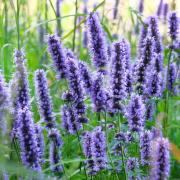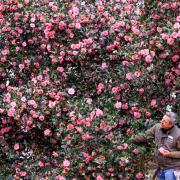The sun may be shining, but if you’ve a north-facing garden, which has more than its quota of shade, don’t worry, you can still lighten it up with some impressive plants.
Tropical-looking large-leaved hostas and feathery ferns, blousy hydrangeas, and colourful rhododendrons and azaleas can all withstand a fair amount of shade, given the right soil conditions.
If you have a shady wall, which offers plants a cool root run, you could brighten it with a vigorous Virginia creeper, which will light it up when its leaves change to vibrant deep red in autumn, or camellias for their rose-like blooms, or delicate-looking hellebores with their nodding late winter and early spring flowers.
Damp sites near ponds or streams will be welcomed by candelabra primulas, ligularia and gunnera (giant rhubarb), while Cyclamen hederifolium, lily turf and dusky cranesbill geraniums will tolerate dry shade, perhaps under trees or alongside hedges, so there really isn’t a reason you can’t brighten up a shady spot.
BEST FOR…
Pots

Hostas: If you love these tropical-looking leafy plants and want to keep the slugs off them, plant them in pots and get them off the ground, preferably on a metal stand, and not near a wall where slugs and snails may climb up and lean far enough over to get on the leaves. Hostas also produce beautiful spikes of purple flowers in summer.
Heucheras: These are such versatile plants, whether as standalone specimens in a pot or added to container displays. They come in a wealth of colours, from acid green to burgundy, providing foliage interest throughout the year, and in summer produce airy sprays of small pale green, white or pink flowers, which are a magnet for bees. They are happiest in damp shade.
Under trees

Carpets of shade-loving plants can be situated under trees in damp shade, although the addition of bulky organic matter will help to conserve moisture and enrich the soil, which is likely to have had its nutrients sapped by the trees. Woodland plants are often the most suitable candidates.
Lily-of-the-valley: This sweetly scented, dainty-looking but tough perennial provides great ground cover, producing small, highly fragrant little white flowers in late spring, adding perfume and colour in woodland areas under trees.
Cyclamen hederifolium: These pretty pint-sized cyclamen bear pale to deep pink flowers in autumn, which appear before the ivy-like leaves and make colourful ground cover in dry shade beneath trees or shrubs, or in containers. They also self-seed easily, creating colonies if protected from summer rain.
Shady walls and courtyards

Camellia japonica: These elegant shrubs can be grown as a free-standing specimen either in the ground or a pot, bearing large rose-like flowers in shades ranging from white to pink and deep red. They do best in dappled shade, but try to avoid placing them where they get the morning sun, as this can damage their shoots, especially after frost.
Ferns: These should do well in a shady courtyard as they are shade and moisture-loving, and make terrific architectural plants, especially when their unfurling fronds offer a feathery, rich green hue in spring, which remains in place well into autumn. You can plant them in pots or in a raised bed to bring them closer to you in a courtyard.
Shady borders

Japanese anemone: Some gardeners find these tough perennials a bit of a bugbear, because once they’re established, it’ll take some work to get rid of them. But they do add a boost of colour, bearing tall spikes of white or pink flowers in autumn, when many other blooms are spent.
Cranesbill geranium: These are not like your annual geraniums that you can buy as bedding from garden centres. In fact, they are among the toughest perennials that make ideal ground cover at the front of borders, thriving in poor, dry soil in the shade, and growing vigorously to form large clumps. Among the most impressive is ‘Rozanne’, which produces masses of purple flowers in summer.
Fatsia japonica: For a showstopping plant, this shade-lover, also known as the false castor oil plant, with huge palmate leaves, will not disappoint. It’s as tough as old boots and you can grow it virtually anywhere in the shade, growing up to 1.5m high and 1.25m wide. Look carefully and you’ll see that it also flowers in late autumn, producing greenish-white globes that look a bit like ivy flowers.


























